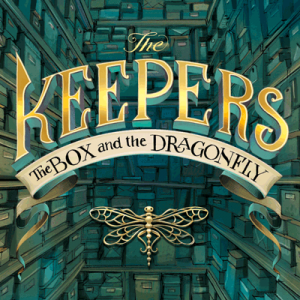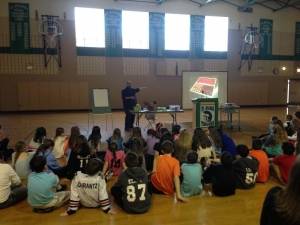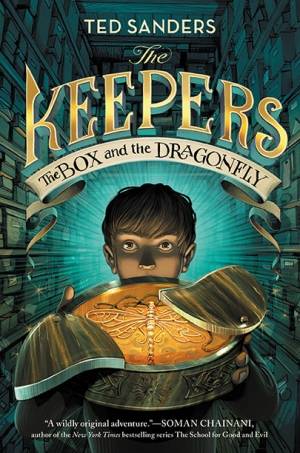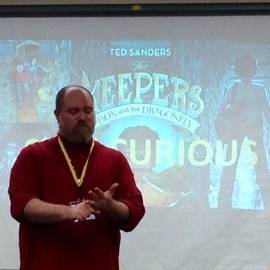It’s nice to see people be recognized for their good work—especially when it’s someone from your school, your neighborhood, your town. And there’s a pretty gobsmacking amount of creativity in the C-U area, as I’m sure you’ve noticed. We’ve had artists, actors, directors, movie producers, and certainly authors come from the C-U area before, and I’m sure whatever magic was in the water when they were growing up hasn’t gone away. (And when I say “magic,” of course I’m being glib; believe me, I know these are some smart, driven, talented, hard-working individuals who deserve their success.)
 Right now, Urbana resident and U of I professor Ted Sanders (pictured, right) is having quite a moment. His new middle-school-geared book, The Keepers: The Box and the Dragonfly (the first in a proposed four-book series) is out and getting a big push from its publisher, HarperCollins. You might have seen my review for the book last week; if not, let me summarize it thusly: this is a great book — not just for kids, but for anyone who enjoys YA lit in general. (And, if you think only kids read “kid lit,” you might want to think back a few years to when a certain bespectacled boy-wizard was kind of popular.)
Right now, Urbana resident and U of I professor Ted Sanders (pictured, right) is having quite a moment. His new middle-school-geared book, The Keepers: The Box and the Dragonfly (the first in a proposed four-book series) is out and getting a big push from its publisher, HarperCollins. You might have seen my review for the book last week; if not, let me summarize it thusly: this is a great book — not just for kids, but for anyone who enjoys YA lit in general. (And, if you think only kids read “kid lit,” you might want to think back a few years to when a certain bespectacled boy-wizard was kind of popular.)
The Box and the Dragonfly introduces us to Horace Andrews and his fellow Keepers, each of them entrusted with (and bonded to) an alien element (called a Tan’ji) that allows them to do the impossible. You see, a conflict—long gestating under our noses and beneath our streets — is about to erupt, and these kids are on the front lines.
What is at stake? Who is the enemy? Well, read it and find out.
In the meantime, Sanders was good enough to answer a few of my questions on a short break from his very busy book tour.
Into the Nevren, Keepers. See you on the other side.
[Editor’s note: If you’ve read the book already, you’ll get that last reference.]
———
Smile Politely: Let’s go back. What literary influences can you point to from your childhood that might have led us here? Were you a comic book kid? Encyclopedia Brown? What would Horace’s creator have been reading when he was Horace’s age?
Ted Sanders: When I was a kid, I read pretty much everything. I did read Encyclopedia Brown, yeah. By the time I was Horace’s age, I think I had started digging secretly into my parents’s Stephen King collection, but I was still reading kid’s books, too.
[Additional editor’s note: If you read the review from last week, you might be experiencing a little deja vu. Me, too.]
 Sanders: Two big specific influences from childhood are The Westing Game, by Ellen Raskin, and A Wrinkle in Time, by Madeleine L’Engle. Westing Game is just a great puzzle mystery, with lots of humor and brilliant wordplay. I’m sure it inspired some of the wordplay in The Box and the Dragonfly. And then Wrinkle in Time: the science, the notion of the characters trying to wrap their heads around complicated physical issues of the universe. There’s a scene in my book directly influenced by the ant-on-a-string scene in L’Engle’s book.
Sanders: Two big specific influences from childhood are The Westing Game, by Ellen Raskin, and A Wrinkle in Time, by Madeleine L’Engle. Westing Game is just a great puzzle mystery, with lots of humor and brilliant wordplay. I’m sure it inspired some of the wordplay in The Box and the Dragonfly. And then Wrinkle in Time: the science, the notion of the characters trying to wrap their heads around complicated physical issues of the universe. There’s a scene in my book directly influenced by the ant-on-a-string scene in L’Engle’s book.
SP: One of my favorite aspects of the book, and one that I think makes it relatable, is the setting. What made you decide to place your story in the very real and recognizable world of Chicago, as opposed to, say, a magical kingdom or alternate reality, where anything goes?
Sanders: Well, I wanted an urban or contemporary fantasy, one where the fantastic elements are happening beneath the surface of the familiar world. When you go high fantasy — that’s what you’re talking about with made-up worlds — it’s a whole different scenario that can alienate some readers. Plus, the “anything goes” aesthetic just didn’t appeal to me. I like the plausible underbelly.
I actually briefly considered setting the series in C-U, but then — remembering other books I’d loved as a kid, like From the Mixed-up Files of Mrs. Basil E. Frankweiler, where the big city had this enormous appeal as a bustling place of secrets and adventure — I went with Chicago.
Sadly, I’m not as familiar with Chicago as I’d like, especially with neighborhood and stuff outside the obvious destination zones, so I have to research. I roam around when I’m up there. I spend a lot of time on Google Earth, particularly as I’m writing Book 2.
SP: The Young Adult, Middle School, and Teen Fiction genres are booming right now, and it’s easy to find a lot of “big-name” writers attached to books aimed at kids. I’ve often wondered, perhaps cynically, if these authors are “watering down” their work for younger audiences in order to jump onto a trend. I’m not saying that about your work at all, by the way. Far from it. In fact, all this preamble is my lead-up to wondering — since you do this well — how you write something to a particular age group without “writing down” to them. How do you decide upon the voice?
 Sanders: Yeah, that’s a great question. The truth is, writers find a lot of their voice through reading and reading and reading, through a kind of many-pronged and recombinant process none of us really understand. And I read a lot of kids books, so I kind of know what voice feels right.
Sanders: Yeah, that’s a great question. The truth is, writers find a lot of their voice through reading and reading and reading, through a kind of many-pronged and recombinant process none of us really understand. And I read a lot of kids books, so I kind of know what voice feels right.
And as for watering down for kids: I can’t say I don’t do that, relative to my stuff for adults. Certainly language-wise, The Box and the Dragonfly is watered down. But I guess I would suggest that probably kids are right to be phenomenally bored by most of the stuff we literary types produce. There’s a lot of boring crap out there that people only publish and read because they want to be published and get read themselves…and I include some of my own stuff in that assessment. So maybe, really, I’m writing UP to kids.
SP: That’s a great answer. And having read the book, writing up to kids sounds about right.
 On another topic: It seemed, at various times throughout the book, as if Horace was (to put it delicately) a heavier kid. Carrying a few extra pounds. The final art for the book (which is gorgeous) depicts him as being kind of skinny and average, size-wise. Was I just reading it wrong? No criticism is intended, because he’s a great character. I just found it refreshing, having grown up a husky lad myself, to read about a protagonist who might not be totally comfortable with himself, physically. Did I just read way too much into that?
On another topic: It seemed, at various times throughout the book, as if Horace was (to put it delicately) a heavier kid. Carrying a few extra pounds. The final art for the book (which is gorgeous) depicts him as being kind of skinny and average, size-wise. Was I just reading it wrong? No criticism is intended, because he’s a great character. I just found it refreshing, having grown up a husky lad myself, to read about a protagonist who might not be totally comfortable with himself, physically. Did I just read way too much into that?
Sanders: No, you’re not alone in that. The one criticism I hear most about the book is that I didn’t describe the characters enough, physically. Young readers need that, especially. I always pictured Horace as tall and kind of husky, meaty but not fat. But he’s our POV character, and growing, so it’s more that he himself FEELS big. He definitely is uncomfortable with himself, self-conscious about his size and ungainliness.
[One last Editor’s Note: I didn’t find the characters “under-described” at all. I actually had a very clear picture of them, all the way through.]
SP: I know this book is the first entry in a series, so I know you have other adventures charted out and an endgame in place. I won’t ask for a preview of any of that, but I am curious about whether or not committing yourself to another two or three more books about this subject precludes you from other writing. Have you put other projects on hold for now, or are you able to write concurrently?
Sanders: Yes, there will be three more books in the series, so I’m in for the long haul on that, assuming the series does well enough to stay alive. And it’s turning into a full-time job, with the writing and the promotion and the travel and whatnot. I can’t really afford the time to work on other projects. I still have a collection of essays I’d like to finish, but that’s not going to happen any time soon.
That’s a little bit of a bummer, I guess, but I enjoy working on The Keepers the most anyway. So if I’m stuck in a room, at least it’s the best room.
SP: I imagine things are terribly busy for you right now, and I wonder if you might share a little bit of your schedule with us. What is your week like?
Sanders: Well, I’m on tour right now, so I basically drive to whatever hotel HarperCollins has booked me at, drive out to my first school visit of the day, do my presentation for anywhere from 40 to 400 kids. Knock their socks off, of course. Then the rep from the host bookstore has me sign books for kids and for the store, and hopefully I get to meet some of the kids, and that’s a ton of fun.
Then another school or two, then maybe a public event at the bookstore at night, then back to hotel. The next day, probably another city, another hotel, more schools. I often don’t remember exactly where I am. I’m in Dayton as I write this, pretty sure. Yes, Dayton. Tomorrow Chicago.
When I’m off tour, I write, answer emails, and write some more.
SP: One last question. This one will surely occur to anyone who reads the book, but I’m the one who gets to ask you, so here goes: What would your Tan’ji be, and what would it allow you to do?
Sanders: I have actually thought about this, and I gave an answer on my website… I would want a Tan’ji that gives me bionic vision. I really want to see everything I can. The world is pretty amazing, and much as I stare I can’t help but feel that I’m missing a lot.
As for Tan’ji that are in the book, it would be very cool to have Chloe’s, or Neptune’s. I definitely would NOT want Horace’s Tan’ji. Seems like asking for trouble.
———
The Keepers: The Box and the Dragonfly is now available wherever you get your books — retail stores, online, or from the public library. And you can definitely look forward to updates on the other installments as they materialize.
And, if you’d like to see Sanders in person, reading straight into your ears, he’ll be appearing at the Illini Union Bookstore on April 23rd.








